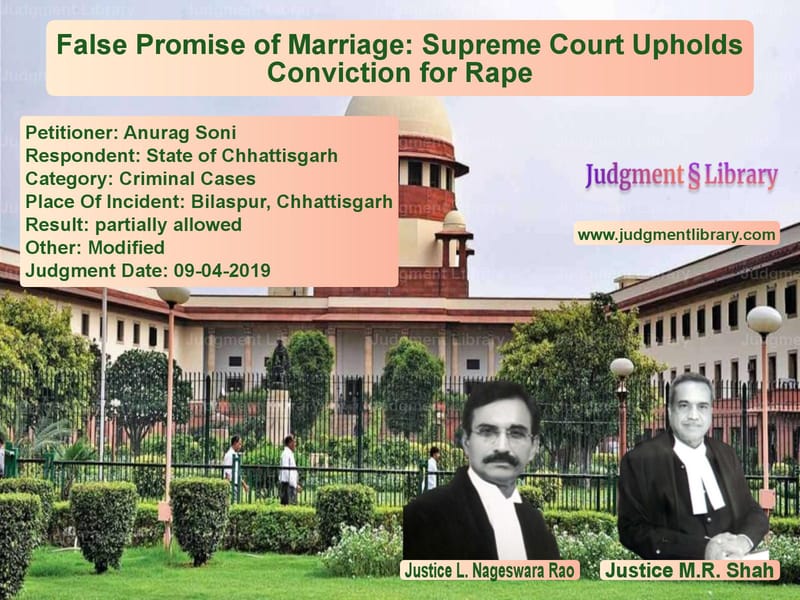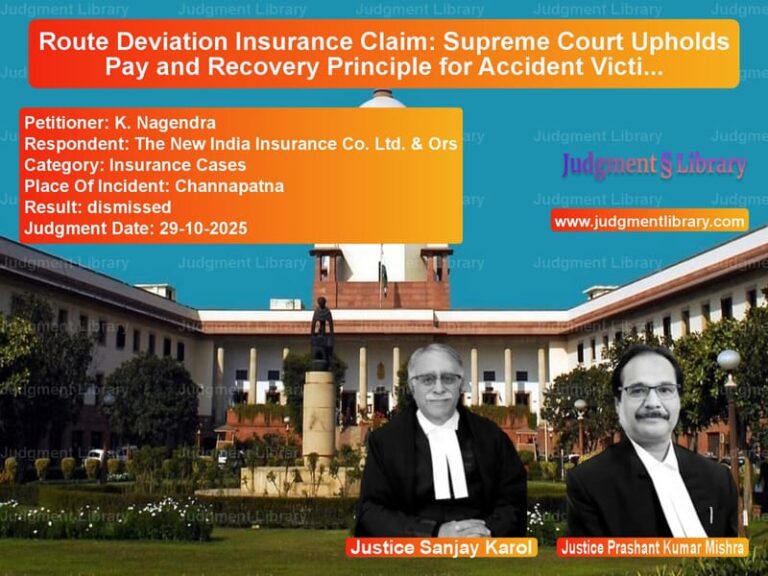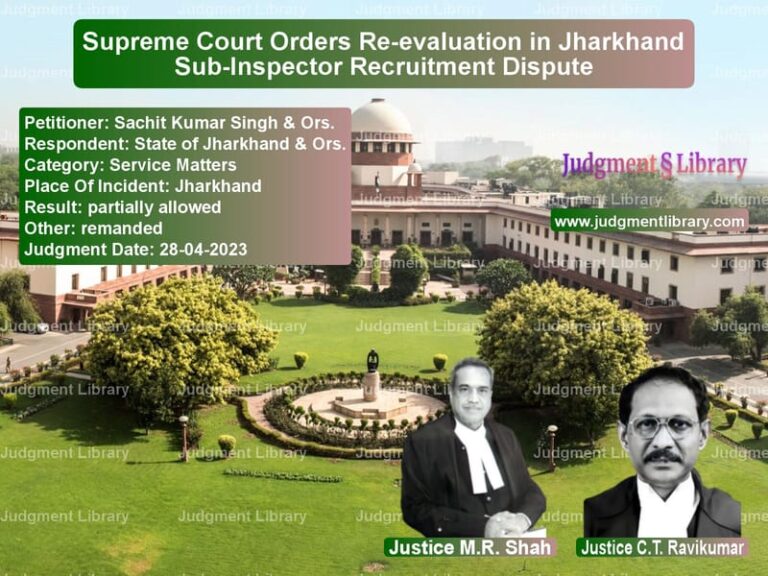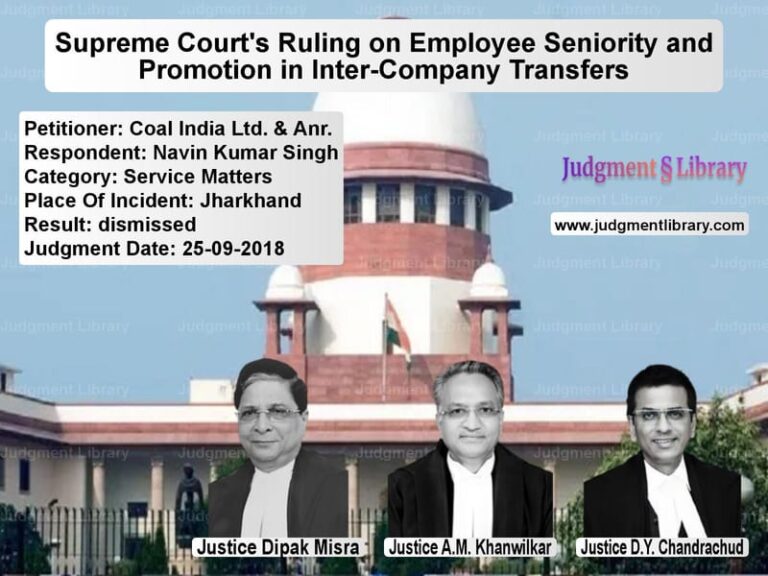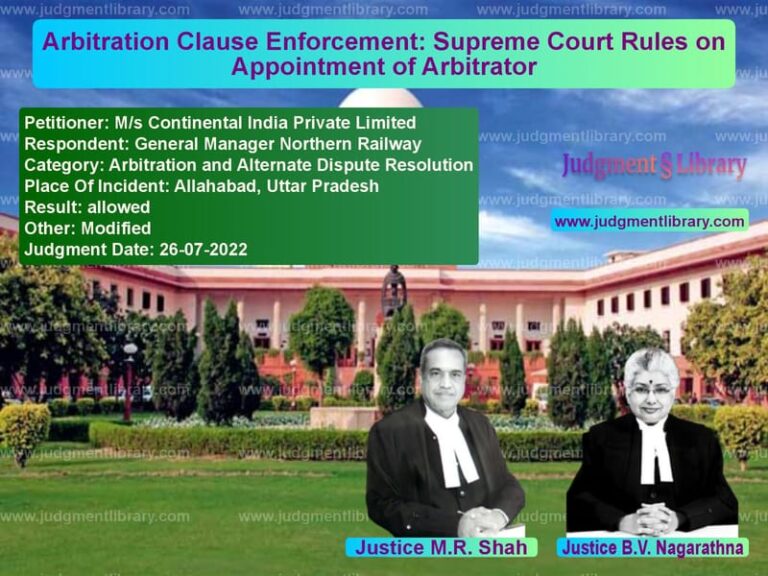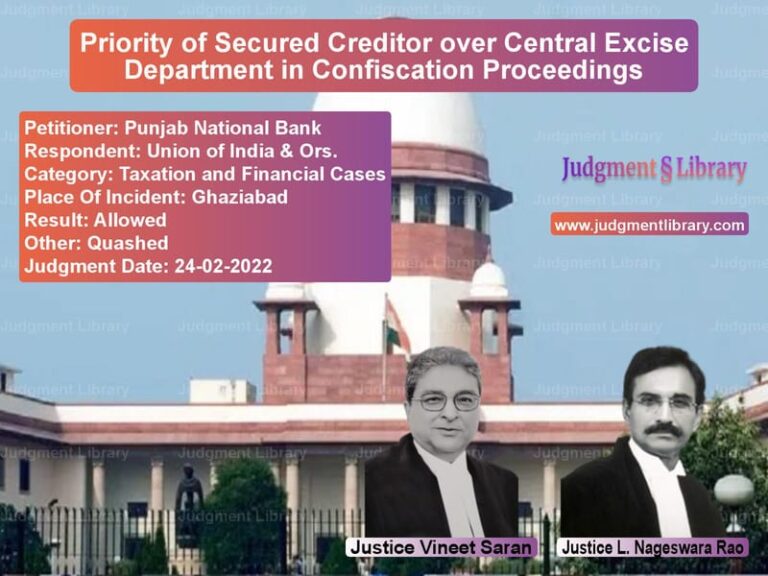False Promise of Marriage: Supreme Court Upholds Conviction for Rape
The Supreme Court of India, in its judgment dated April 9, 2019, addressed a crucial issue regarding consent in cases of sexual intercourse based on a false promise of marriage. The case, Anurag Soni v. State of Chhattisgarh, involved the conviction of the appellant under Section 376 of the Indian Penal Code (IPC) for establishing physical relations with the prosecutrix under the pretense of marriage.
Background of the Case
The prosecutrix and the appellant, Anurag Soni, had been in a relationship since 2009. The appellant had proposed marriage, and their families were aware of their relationship. At the time of the incident, the accused was working as a Junior Doctor at a government hospital, and the prosecutrix was pursuing Pharmacy studies in Bhilai.
On April 29, 2013, the prosecutrix traveled to meet the accused at Maalkharoda. She stayed at his house from April 29 to April 30, during which the accused established physical relations with her under the promise of marriage. However, he later avoided conversations about marriage. The prosecutrix informed her family on May 6, 2013, and upon intervention by both families, the accused initially agreed to marry her but later refused and married another woman, Priyanka Soni, on June 10, 2013.
Legal Proceedings
Following the accused’s refusal to marry, the prosecutrix filed a complaint on June 21, 2013, leading to an FIR under Section 376 IPC. The prosecution gathered evidence, including witness testimonies, medical reports, and the accused’s prior communications. The Sessions Court convicted the accused, sentencing him to 10 years of rigorous imprisonment and imposing a fine of Rs. 50,000.
The accused appealed to the Chhattisgarh High Court, which upheld the conviction. Subsequently, he approached the Supreme Court, challenging the findings on the grounds that the relationship was consensual and that his failure to marry did not amount to rape.
Petitioner’s (Anurag Soni) Arguments
- The relationship was consensual, and there was no fraudulent intent to deceive the prosecutrix.
- The prosecutrix was aware of the possibility that marriage might not happen.
- Failure to marry due to external circumstances should not be equated with obtaining consent under false pretenses.
- The High Court did not properly assess the distinction between breach of promise and intentional deception.
Respondent’s (State of Chhattisgarh) Arguments
- The accused misled the prosecutrix by falsely promising marriage, intending only to engage in physical relations.
- From the inception, the accused knew his marriage was arranged with another woman.
- The prosecutrix consented to sexual relations solely based on the assurance of marriage, making the consent invalid under Section 90 IPC.
- The courts correctly applied the principles laid down in previous judgments regarding consent obtained through deception.
Supreme Court’s Observations
The Supreme Court analyzed various precedents, including Deepak Gulati v. State of Haryana, Uday v. State of Karnataka, and Naushad v. State of UP. It reiterated that consent obtained under a misconception of fact does not constitute valid consent under Section 90 IPC.
The Court noted:
- From the beginning, the accused had no intention of marrying the prosecutrix.
- The prosecutrix resisted initially but agreed only after the accused assured marriage.
- The accused married another woman while continuing to mislead the prosecutrix.
- Consent under a false promise of marriage, when the intention was never to fulfill it, amounts to rape.
Final Judgment
The Supreme Court upheld the conviction but reduced the sentence from 10 years to 7 years of rigorous imprisonment, considering mitigating factors. It concluded:
“The consent obtained on the false promise of marriage is no consent in the eyes of law. The appellant had mala fide motives and took advantage of the prosecutrix under false pretenses.”
Impact of the Judgment
This ruling has significant legal and societal implications:
- Clarifies Consent Laws: Establishes that consent obtained under false promises is not legally valid.
- Deters Exploitation: Prevents individuals from misleading partners into sexual relations under deceptive pretexts.
- Strengthens Legal Precedents: Reinforces prior Supreme Court rulings on false promises of marriage.
- Ensures Justice for Victims: Recognizes the emotional and psychological trauma of victims who are misled.
Conclusion
The Supreme Court’s decision in Anurag Soni v. State of Chhattisgarh is a landmark ruling in defining consent under the IPC. By upholding the principle that fraudulent promises invalidate consent, the judgment strengthens legal protections for victims and ensures accountability for perpetrators.
Petitioner Name: Anurag Soni.Respondent Name: State of Chhattisgarh.Judgment By: Justice L. Nageswara Rao, Justice M.R. Shah.Place Of Incident: Bilaspur, Chhattisgarh.Judgment Date: 09-04-2019.
Don’t miss out on the full details! Download the complete judgment in PDF format below and gain valuable insights instantly!
Download Judgment: Anurag Soni vs State of Chhattisgar Supreme Court of India Judgment Dated 09-04-2019.pdf
Direct Downlaod Judgment: Direct downlaod this Judgment
See all petitions in Rape Cases
See all petitions in Fraud and Forgery
See all petitions in Bail and Anticipatory Bail
See all petitions in Judgment by L. Nageswara Rao
See all petitions in Judgment by Mukeshkumar Rasikbhai Shah
See all petitions in partially allowed
See all petitions in Modified
See all petitions in supreme court of India judgments April 2019
See all petitions in 2019 judgments
See all posts in Criminal Cases Category
See all allowed petitions in Criminal Cases Category
See all Dismissed petitions in Criminal Cases Category
See all partially allowed petitions in Criminal Cases Category

